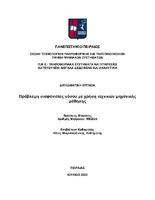Πρόβλεψη στεφανιαίας νόσου με χρήση τεχνικών μηχανικής μάθησης

View/
Keywords
Μηχανική μάθηση ; Εκτίμηση ρίσκου ; Yπερδειγματοληψία ; Στεφανιαία νόσος ; Επιλογή χαρακτηριστικών ; Προβλεπτικά μοντέλαAbstract
The health sector has been influenced by technology, as it is evolving rapidly. Like any
modern technological tool, medical devices and tools produce a great deal of data. In
recent years the daily volume of data produced around the world has become difficult to
manage and the best solutions are constantly being sought to improve their management.
Many times, through them, reasonable and useful conclusions can be drawn on various
issues of everyday life, as in the case of health. Through the recording of the history of
medical data for various symptoms that concern patients, conclusions are drawn through
which provisions and precautions are proposed for the patients themselves, but also for
future ones with a similar medical history or symptoms. The purpose of this thesis is to
create model predictions through a dataset from people who have undergone
examinations concerning their heart, if in the next 10 years they will possibly show
symptoms of coronary heart disease. Coronary heart disease is a condition in which the
arteries of the heart cannot deliver enough oxygen-rich blood to the heart. This condition
can cause serious health problems and even lead to death. Thus, having the dataset and
with the help of some machine learning models, but also machine learning techniques,
an attempt was made to find the best one that predicts, according to the data of each
patient, with the best accuracy the occurrence of coronary heart disease in next 10 years.
Also, through risk assessment and with the help of algorithms that award points to certain
symptoms of the patient, a corresponding prediction is made by calculating the
percentage of the probability of occurrence of coronary heart disease through different
conditions. With the help of the above, an attempt was made to implement a simple
application through which a patient, by registering his/her symptoms and data, can be
informed about the future in terms of the cardiovascular problem of coronary heart
disease. In the end, the conclusions that emerged in the experimental process are
analyzed.

